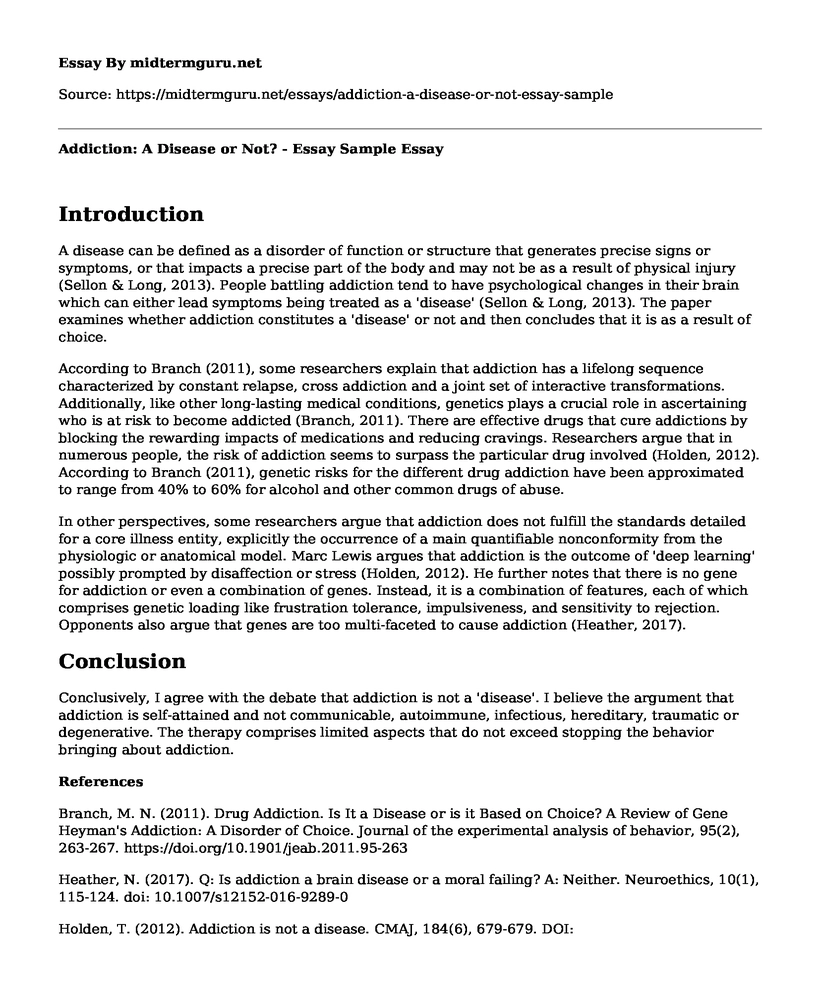Introduction
A disease can be defined as a disorder of function or structure that generates precise signs or symptoms, or that impacts a precise part of the body and may not be as a result of physical injury (Sellon & Long, 2013). People battling addiction tend to have psychological changes in their brain which can either lead symptoms being treated as a 'disease' (Sellon & Long, 2013). The paper examines whether addiction constitutes a 'disease' or not and then concludes that it is as a result of choice.
According to Branch (2011), some researchers explain that addiction has a lifelong sequence characterized by constant relapse, cross addiction and a joint set of interactive transformations. Additionally, like other long-lasting medical conditions, genetics plays a crucial role in ascertaining who is at risk to become addicted (Branch, 2011). There are effective drugs that cure addictions by blocking the rewarding impacts of medications and reducing cravings. Researchers argue that in numerous people, the risk of addiction seems to surpass the particular drug involved (Holden, 2012). According to Branch (2011), genetic risks for the different drug addiction have been approximated to range from 40% to 60% for alcohol and other common drugs of abuse.
In other perspectives, some researchers argue that addiction does not fulfill the standards detailed for a core illness entity, explicitly the occurrence of a main quantifiable nonconformity from the physiologic or anatomical model. Marc Lewis argues that addiction is the outcome of 'deep learning' possibly prompted by disaffection or stress (Holden, 2012). He further notes that there is no gene for addiction or even a combination of genes. Instead, it is a combination of features, each of which comprises genetic loading like frustration tolerance, impulsiveness, and sensitivity to rejection. Opponents also argue that genes are too multi-faceted to cause addiction (Heather, 2017).
Conclusion
Conclusively, I agree with the debate that addiction is not a 'disease'. I believe the argument that addiction is self-attained and not communicable, autoimmune, infectious, hereditary, traumatic or degenerative. The therapy comprises limited aspects that do not exceed stopping the behavior bringing about addiction.
References
Branch, M. N. (2011). Drug Addiction. Is It a Disease or is it Based on Choice? A Review of Gene Heyman's Addiction: A Disorder of Choice. Journal of the experimental analysis of behavior, 95(2), 263-267. https://doi.org/10.1901/jeab.2011.95-263
Heather, N. (2017). Q: Is addiction a brain disease or a moral failing? A: Neither. Neuroethics, 10(1), 115-124. doi: 10.1007/s12152-016-9289-0
Holden, T. (2012). Addiction is not a disease. CMAJ, 184(6), 679-679. DOI: https://doi.org/10.1503/cmaj.112-2033
Sellon, D. C., & Long, M. (2013). Equine Infectious Diseases E-Book. Saunders.
Cite this page
Addiction: A Disease or Not? - Essay Sample. (2023, Feb 06). Retrieved from https://midtermguru.com/essays/addiction-a-disease-or-not-essay-sample
If you are the original author of this essay and no longer wish to have it published on the midtermguru.com website, please click below to request its removal:
- Research Paper on Abortion and Planned Parenthood
- Essay Sample on Gender Differences in Aggression
- Best Learning Environments for Learners With Disabilities - Research Paper
- Protecting Children: Rise of Child Abuse Despite Efforts to Combat It - Essay Sample
- Professional Development Plan: A Tool for Career Advancement - Essay Sample
- Equal Employment: Overcoming Racism, Homelessness to Achieve Success - Essay Sample
- Paper Example on Issues that Affect Large Group of People







